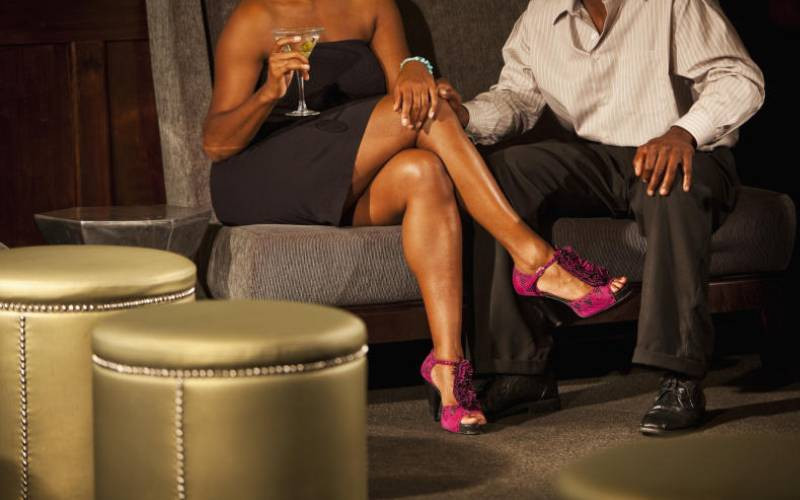
It’s a confusing time to date in the pursuit of marriage. In the past, the advice offered was standard.
It went something like “Be kind to each other, put in work on your relationship, be loyal” and the regular titbits that make sure both parties are happy.
But relationship advice being handed to women today has evolved to an unrecognisable level and is heavily pegged on money.
It’s as though the genders are at war, with a section of women up in arms, refusing to date men who will not pay their bills and cater to their financial needs.
One popular personality on social media, Shera Seven, an American woman, has created a revolution of her kind, telling the ladies that the only way to win love is to marry rich.
Her TikTok account has taken the dating scene by storm, garnering a cumulative 35 million likes to date, as she also enjoys a growing fan base with over a million followers. Not to mention pseudo accounts that repost her content, each gaining millions of followers.
Shera’s advice is often centred on the woman’s monetary needs, and she ends her daily counsel with the now popular phrase, “Sprinkle Sprinkle.”
Now known as the Sprinkle Sprinkle Lady, Shera goes live on TikTok often, answering questions from single women with witty comebacks.
- Returning to work after maternity leave
- Teach your children good values at an early age
- Keeping your children busy over the holidays
- Safely include your children in the kitchen with these tips
Keep Reading
“How to respond when he says he didn’t get paid yet?” One woman poses on a live session this week.
Shera answers: “Go to the other one and get his money. You are dealing with a man who lives paycheck to paycheck? That’s not no sugar daddy ma’ am. You need to go find somebody that doesn’t have to wait till they get paid. Do better. Sprinkle Sprinkle.”
Entertainment website Vox calls out the self-described dating experts on TikTok, reporting that the advice being pushed is both regressive and sexist.

“Herein lies the paradox of Shera Seven: As hilarious as she is, she is also part of a wave of arguably regressive and deeply nihilistic ‘dating experts’ currently taking over TikTok. A scroll through the hashtags #datingadvice, #datingcoach, and #datingexpert will reveal hundreds of these authorities, with many lauding their credentials (a BS in psychology, for example) to spew advice for heterosexual singles.”
The report adds: “Not all are created equal; some are more blatantly gender essentialist than others (when men “provide,” women will naturally “submit,” etc.), some cloak their beliefs in New Ageisms like “embracing the ‘divine feminine.”
In the age of this dating revolution, it’s hard to tell what can make a relationship truly happy and successful.
Is it best that a man provides financial stability and the woman stays home, providing emotional support, just as it was in the past when women didn’t have the same opportunities as men and couldn’t work?
Counselling Psychologist Geoffrey Wango tells Eve magazine that the lines have blurred when it comes to the definitions of a relationship.
“When we talk about a relationship, we are talking about a connection between people. So when we cap it on money, or property, or a benefit that accrues from the relationship, it becomes very difficult to determine whether the relationship is genuine or not.”
Dr Wango adds: “On the other hand, we must also accept that money is a major issue in our lives today. However, we cannot equate relationships with money or with property. Money is a part of the extras that come with the relationship, like having children, eating, paying bills and doing all those things, but that is not the essence of a relationship.”
“The essence of the relationship is the connection between two people, so it cannot be equated to property and people having money or one being with another because of the benefits that they are accruing from the relationship.”
The revolution has not gone unnoticed by men, who are increasingly being hit with having to pay up to get romance.
Those opposing Shera’s teachings have created their movement, dubbed “Drizzle Drizzle”, and they are advocating for lower financial expectations from their female counterparts.
“In this Drizzle Drizzle movement, men are advocating a soft life for themselves. They are standing up and saying that I am more than an ATM. I have more value than just being a provider. I feel dismissed and underappreciated. I want to live a soft, comfortable, loving life too,” Serena Hinton writes on Medium.
She however argues that Shera’s teachings are “bringing standards back into dating” and “pushing men to put more effort into relationships.”
Counselling Psychologist Wango says there are implications for both parties when it comes to approaching relationships with a money-oriented mind.
The ‘provider’ may question the genuineness of the relationship, while the person being provided for may not value the relationship but instead value the material contribution, hindering the growth of the union.
“The material can take over and overwhelm the relationship, such that even if both of them had intended it for the good, the material and money perspective can overtake the relationship and in that case undermine it,” he says.
He adds that a lot of the advice-making waves are tied to outdated gender stereotypes and biases.

“In terms of gender psychology, there are many stereotypes that we have for men and women. Part of them is that we are inclined to think that women love money more than men. Or that women are caregivers, homemakers and so forth or that men are the ones who look for money… women are the ones who receive money and would be contended in the relationship only if it has money,” Dr Wango says, adding that these stereotypes don’t improve a relationship.
The psychologist notes that while in the past, the male gender has tended to be more advantaged, leading him to have the money whereas the woman did not, the situation has changed.
Nowadays, some women are even more educated than their male counterparts, and they have the choice to decide which relationship they want to have.
“The monetary aspect arises from our traditional connections with women as the lesser group in society, and it is a misconception. Otherwise, a relationship is an association between two people, and I have not used the word male or female,” Dr Wango says, adding,
“The problem is that these issues will continue for some time, unfortunately, until we unmask these gender stereotypes and become more open to discussing them.”
While it is a nice thought that a woman can live a soft, glamorous life with her man dotting on her, singles searching for love should be cautious about the genuineness of the unions they choose to get into.
It comes down to both parties getting into the relationship “understanding their terms of connection,” as Dr Wango puts it.
There have been horror stories of beautiful young women seeking monetary gain in the dating game, like the Young, Famous and African star Khanyi Mbau, who, while often speaking up about her preference for dating rich men, warns that it is not always rosy.
Late last year, the South African socialite revealed that she had been in a brutally abusive relationship, and opened up about the lows that came with chasing financial stability in relationships.
“My generation that created this culture, the Queen of Bling culture, it was me covering my wounds with what shines and thought it was gold. But now I went into self nami because I went through abuse chasing these things. I went through loss chasing these things. I lost my dignity. I lost my voice because when you are with a man that gives you all of that you have no voice. You are just a doll sitting on a shelf. I had to go into self because it gave me depression,” Khanyi said.
Dr Wango suggests that our generation has got it all mixed up because both parties in a relationship have emotional needs and therefore both need each other.
He says: “A relationship is for the mutual benefit of both partners.
We must think about money and materials, especially in the present economic world where we are all struggling to survive. But it should not override the need to have a relationship and to respect our mutual partners.”
 The Standard Group Plc is a multi-media organization with investments in media platforms spanning newspaper print
operations, television, radio broadcasting, digital and online services. The Standard Group is recognized as a
leading multi-media house in Kenya with a key influence in matters of national and international interest.
The Standard Group Plc is a multi-media organization with investments in media platforms spanning newspaper print
operations, television, radio broadcasting, digital and online services. The Standard Group is recognized as a
leading multi-media house in Kenya with a key influence in matters of national and international interest.










